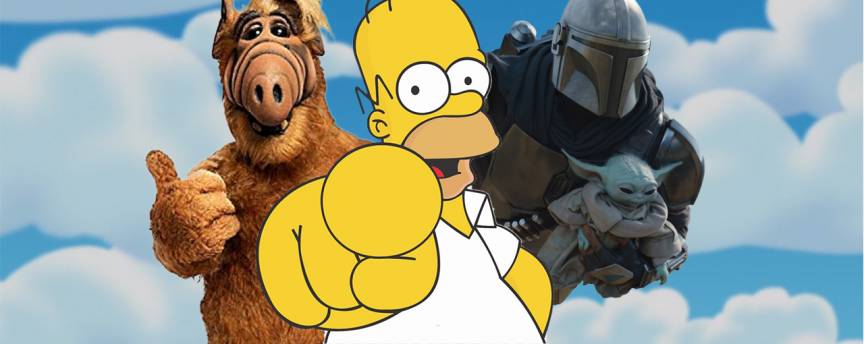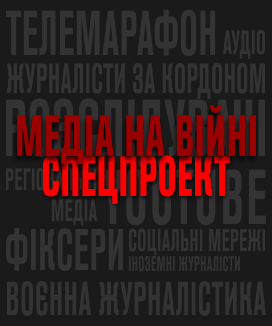"Remember the feeling you had holding a Ukrainian passport abroad, or telling people where you're from? Compare it to how it has changed now. The same goes for Ukrainian producers: now people want to talk to you. The doors are opening much easier than they used to," Kateryna Vyshnevska responds to the question about how the attitude towards cooperation proposals from Ukrainian content makers has changed in the world over a year of full-scale war. However, she also points out, "There is a nuance, and it lies in the fact that such collaborations are primarily business-driven. While initiating negotiations may be easier, the challenge lies in the fact that Ukrainian producers often lack the financial resources to support co-production ideas. This can pose a problem."
In our interview with the Head of Development and Co-Productions at FILM.UA Group, we delve into the topics of what kind of content is worth proposing at industry events, how the landscape and audience of the European audiovisual market have been affected by the war in Ukraine, and the strategic importance of industrial unity within Ukraine and across the Eastern European region. As someone who has been instrumental in attracting international partnerships to Ukraine for years, our interviewee provides valuable insights into these issues.

– Kateryna, we are speaking with you shortly after the anniversary of the full-scale invasion. I apologize for such a personal question, but could you share with us your experience during the first days of the war?
– I had just arrived in Kyiv on February 22nd, so I remember it vividly... On the 23rd, FILM.UA premiered a comedy film called Big Picnic. Everyone returned home tired but satisfied, and in the morning we woke up to the sound of sirens... The next few days, my family and I spent at the Zoloti Vorota metro station.
And you know, it may sound strange, but I am grateful that I was in Ukraine at that time. It seems to me that it's better to experience such moments with your country and your loved ones. I also feel fortunate to have many foreign friends and partners. I remained in Ukraine until mid-March and during that time, I recorded numerous interviews that were aired on NBC News in America, BBC News in England, Business Insider, and elsewhere. People within the industry actively shared this content. Our tragedy was no longer abstract to them because it happened "live" with a person they had known for many years. This later allowed me to discuss all these, let's say, ideological issues in a well-considered manner.
– How and when did you manage to resume work and initiate this communication?
– It was in April 2022 when we resumed work. For me, building bridges between Ukraine and the world has always been my ambition and profession, and the war gave it an added impetus. About a month after the start of the full-scale war, the industry and all of us were in shock. However, we soon realized the need to tell our stories, preserve the industry, and that we could not do it without the support of the international community.
For the past few years, FILM.UA has been actively working in international markets: it was our strategic vector. At first, we just sold our content. Then we started to involve partners at earlier stages: this is the experience of series such as The Sniffer and Hide and Seek. And in this context, the Ukraine Content Club (UCC) initiative, which was launched last April, is a logical next step in this chain.
We approached the international audiovisual market with a proposal: you will purchase our content later. While we appreciate the current increase in purchases due to solidarity, our primary aim is quality, engaging content for the audience. Unfortunately, we cannot physically produce such content without your investment. We suggest you purchase it at earlier stages, such as during the script writing or development process. This is the vision of UCC.
– The implementation of this idea would have been impossible without an internal industry collaboration effort, which before the full-scale war seemed like a far-fetched concept.
– However, in reality, the global cooperation between media groups formed quite rapidly and organically, as media is an integral part of our community and society. When our entire society came together, there was no reason why the media industry should not do the same. The question is whether it would be easy or difficult. Undoubtedly, at some point, it becomes challenging since everyone has their own opinions and interests. Nevertheless, at the beginning of the full-scale war, we all realized that this collaboration was the only step that we had to take, and we did it.
Let me explain how all of this works in general. UCC was founded by three Ukrainian media groups: Starlight Media, 1+1 Media, and FILM.UA Group. We work in two areas: drama series and documentaries, the launch of which we will officially announce at MIPTV in Cannes this April. The Public Broadcaster has also joined the documentary direction.

We recognize that the current state of the industry is challenging and our top priority is to ensure that our industry as a whole can withstand these conditions. As media groups, we believe that the best way to achieve this is through practical and systemic cooperation with the global content production industry. Drawing on our own experience and understanding of how the industry works, as well as our belief in our common victory, we propose the use of the UCC mechanism to generate the greatest added value for our local industry.
To achieve this, we have carefully selected six stories from our large library of projects and ideas brought to us by independent producers. Our selection process involved multiple rounds. As a result, we now have six stories. Why only six? We recognize that resources such as time, money, and attention are limited, and therefore we have chosen to focus on realizable goals rather than trying to grab everything at once: nothing would be done that way.
One of the key requirements for the stories was their readiness: we cannot afford to lose a year or more on writing a script. So we have to take stories that are ready to launch. They also have to be timely, diverse, high-quality, and interesting not only for the Ukrainian but also for the international market, because it is to this market that we are proposing to finance production.
The six stories we have selected – Taras: The New Story (1+1 media), Tricker (1+1 media), Nest Of Snakes (FILM.UA), Potion (FILM.UA), Really (Starlight Media), and Stolen Happiness (Starlight Media) – have been identified as some of the best stories that Ukraine can offer to the world at this time. It is important to note that our selection is not only based on our own opinions but also the expert opinions of professionals in the industry.
– Who are these experts?
– We have gathered an international board of experts with extensive experience and a strong reputation in the industry. These are people from very large companies: David Davoli, President, International of Anonymous Content; Carlo Dusi, Managing Director of Endor Productions Limited; Emmanuelle Guilbart, Co-Founder and Co-CEO of About Premium Content and APC Studios; Marc Lorber, SVP of international TV coproductions and acquisitions at Lionsgate (as of December 31, 2022, Lorber left the company. – MBR); Julie Meldal-Johnsen, EVP global content at ITV Studios; Simon Mirren, renowned writer, showrunner, former Executive Producer of Criminal Minds, and, by the way, Helen Mirren's brother; Henrik Pabst, Chief content officer at Seven.One Entertainment Group; Christian Wikander, who is currently the head of HBO Nordics and is preparing to lead the global scripted content division at Banijay; Olivier Jollet, EVP & International General Manager of Pluto TV, a global AVoD platform owned by Paramount; Louise Pedersen, CEO of All3Media International; Pascal Breton, President of Federation Studios; Karni Ziv, Head of Drama and Comedy at Keshet Broadcasting, Israel's largest channel; Marek Solon-Lipiński, Director of International Relations, Sales and International Relations Department of Poland's national broadcaster, TVP.
Experts will be selecting three stories out of six proposals that will become the slate and the focus of UCC's activities this year. The official announcement of selected stories will be made on April 17th at MIPTV when we reveal them as the finalists of the first wave of UCC. We will be communicating directly with potential clients and investors for each project.
Our main objective is to launch these projects into production this year, and that's why it's important to focus on a small number of them. In fact, if we are successful with three, we will move on to the next three, and so on. We hope that this will be a significant step forward for the industry as we are creating precedents for systematic cooperation and co-production.
– Could you please elaborate on the main advantages that you believe UCC will bring to the Ukrainian industry as a whole?
– To start, it's crucial to highlight that Ukraine Content Club is a private-sector initiative, not a state-driven one. As someone who works for a large company with diverse daily tasks, I can attest that this project added several weeks of work to my already busy schedule, making it a significant part of my life last year. The same can be said for everyone involved in the project, including many individuals from media groups like FILM.UA and MRM. For us, this initiative has become a defining purpose, and we're determined to see it through. Rather than focusing on individual projects, our goal is to create an initiative that showcases Ukraine's media offerings to the global market.

Additionally, it is important to acknowledge the ongoing war in our country. As media groups, we are asking people to pay in advance during these difficult times. We understand that a guarantee is necessary to ensure that the content for which payment has been made in advance will be produced. In this case, our capabilities and reputation serve as guarantees. Through this initiative, we aim to create jobs and set a precedent for cooperation. Other independent Ukrainian producers can leverage the achievements and success of this initiative to showcase their projects on the global stage and demonstrate that Ukrainian content resonates with audiences. It's worth noting that independent producers, screenwriters, and representatives of other creative professions are more than welcome to join us. They can approach FILM.UA, Starlight Media, Suspilne Ukraine, or 1+1 media with their ideas for the next wave of UCC projects.
Today we're discussing the survival of the industry, and while it may sound grandiose, it's a stark reality. As major players, it's our responsibility to ensure its survival, but this is no easy feat. We must think beyond individual projects and consider that FILM.UA Group alone has hundreds of staff who rely on receiving their salaries every month, as do other media groups. Despite over a year of full-scale war, the industry is still standing. However, if we don't generate sufficient projects regularly, then all those employed in the industry will either leave the country or change occupation, and so forth. Smaller production companies may not feel the pressure, and that's understandable. Nonetheless, preserving the industry is paramount, and this industry-wide initiative must create conditions to keep people in the profession and channels as content buyers afloat. Otherwise, there will simply be no one left to work with. Today, your company may have one person, five, or ten, but when it's time to shoot, you'll need at least fifty. They'll have to be sourced somewhere.
– Suppose that we are still far from the actual filming stage, and our main focus is on finding potential international partners for the project. The question we should be asking now is what kind of content is actually in demand: topics, genres, formats, and so on?
– To be frank, I don't have any concrete advice on this matter. I believe we should approach it from the perspective of what is currently feasible. In that sense, documentary projects are quicker to produce and usually require less funding. This is reflected in the market with an increase in the number of documentary projects. It's not practical to focus on period dramas at the moment since productions must be highly dynamic and adaptable, which means anything that demands significant sets, props, etc., is not ideal.
Overall, there's a sense that in these times of unrelenting negative news, when there's an opportunity to tell an uplifting and authentic story, we should take advantage of it because there's a demand for it in the market. An instance of this is the project Those Who Stayed, which we've already put into production.
 It's a narrative about the first weeks and months of the full-scale war – about citizens who stayed in Kyiv when Russians attempted to seize the Ukrainian capital in February-March 2022. However, it's also filled with hope and faith. It's not only about the war, but it's more about the people. That's what's relevant now.
It's a narrative about the first weeks and months of the full-scale war – about citizens who stayed in Kyiv when Russians attempted to seize the Ukrainian capital in February-March 2022. However, it's also filled with hope and faith. It's not only about the war, but it's more about the people. That's what's relevant now.
– And what about game projects? Are stories about the fusion of Ukrainian and global cultures through mass forced migration still relevant?
– Absolutely! If you can find the right story, I believe the current market will support its development. I would personally focus on stories inspired by real-life experiences. Additionally, given the shifts in the European audience over the past year, such stories are likely to be even more relevant and engaging.
– How exactly?
– To begin with, more than 8 million Ukrainians currently reside in close proximity to Europeans. And that's just the official number; during the war, a staggering 18 million people crossed the border. While many have since returned home, they spent a significant amount of time in European countries, interacting with locals, working with them, and sharing experiences. All of this has brought about changes in both us and them. For instance, in Poland, one in every ten people is now of Ukrainian origin. And in the Czech Republic, the proportion is even higher! Given this demographic shift, can any streamer or channel afford to disregard an audience that constitutes over 10% of the local population? Clearly not, especially from a commercial perspective. All in all, the audience has evolved significantly, both in terms of quality and quantity.
– And from an interest standpoint, who are these people around me…
– Exactly. This also applies to our Ukrainian audience. At FILM.UA, we are currently developing a co-production with Estonia – A Girl from Tallinn. Before the full-scale war, when we discussed the project with Ukrainian broadcasters, they expressed disinterest in seeing Estonians on the screen. But now, for the entire Ukrainian audience, Estonians are not merely some people from the Baltic region that we don't quite understand. They are the people who pass us Javelins, who have helped us as few others have. We have all undergone a transformation.

The noir Ukrainian-Estonian project A Girl from Tallinn is dedicated to rethinking the past – a process that is necessary to move freely into the future
– What are some other key aspects of the transformation of the European market for the current year that you can highlight, both in general and in the context of cooperation with Ukraine?
– At the outset of the full-scale invasion, the prevailing sentiment towards us was of 100% charity: everyone simply wanted to help in any way they could. However, after more than a year of the war, everyone has gradually grown weary: people are beginning to look for ways to move beyond this situation, which is understandable given human nature. Under these circumstances, the significance of what we offer to Europe has become even more important: this is not just about helping Ukraine or charity, but about a common vector of industry development. Over the past year, the audiovisual market has undergone significant changes, which are not solely attributable to the war in Ukraine. The cost of producing content is very high, competition has intensified, and European content producers must now compete with large American streaming services.
– In this context, I must mention an idea that I've heard from you during various industry panels regarding the prospects of uniting Eastern European industries, similar to the successful Scandinavian collaboration known as Nordic12. Can you elaborate on how you envision this possible unification and what its potential benefits could be?
Originally planned for 2022, the work on the Eastern European Alliance was disrupted by the war. Nevertheless, the UCC has been embodying the idea in many aspects.
I strongly believe that an alliance among Eastern European countries is not only feasible but also imperative. As small nations, we lack the resources to produce a significant amount of premium content individually. Even Ukraine, which is larger than some Baltic countries, can only create one or two, or at most three high-budget series during peacetime that can compete on the global market. This is not enough to create a buzz in the industry.
Take the example of Scandinavian noir, which has become a global phenomenon. This success was achieved through a joint effort by Scandinavian countries, where they produced a considerable amount of content and created a brand and image that attracted both distributors and channels.
Unfortunately, we haven't had such an approach in Eastern Europe. We release different shows every year, for example, one year – Hide and Seek appeared, and another – Silence – everything is different; it is unclear when the next such project will be released, and it is unclear whether the audience will get used to it... It's challenging to create a stable business model.

For instance, when approaching a distributor, you need to present a sales plan that they can rely on. But if they have no experience with content like yours, it's impossible to make any forecast. As distributors ourselves, we understand this issue. Suppose someone comes to us with a project from Ethiopia, in which we don't have any experience. In that case, we cannot give them an accurate prediction of its potential. This is why we need the alliance to create a precedent that will result in more quality content from Eastern Europe and a profitable business model.
– How do the Eastern European countries perceive this idea? Have you already had discussions with them?
– Yes, we have. They acknowledge it as a potentially great idea. However, as with any unification initiative, the first question is, "How do we make it work?" (smiling). We were supposed to focus on the practical aspects last year, but the current situation has changed. But we will win – and we will make it work!





